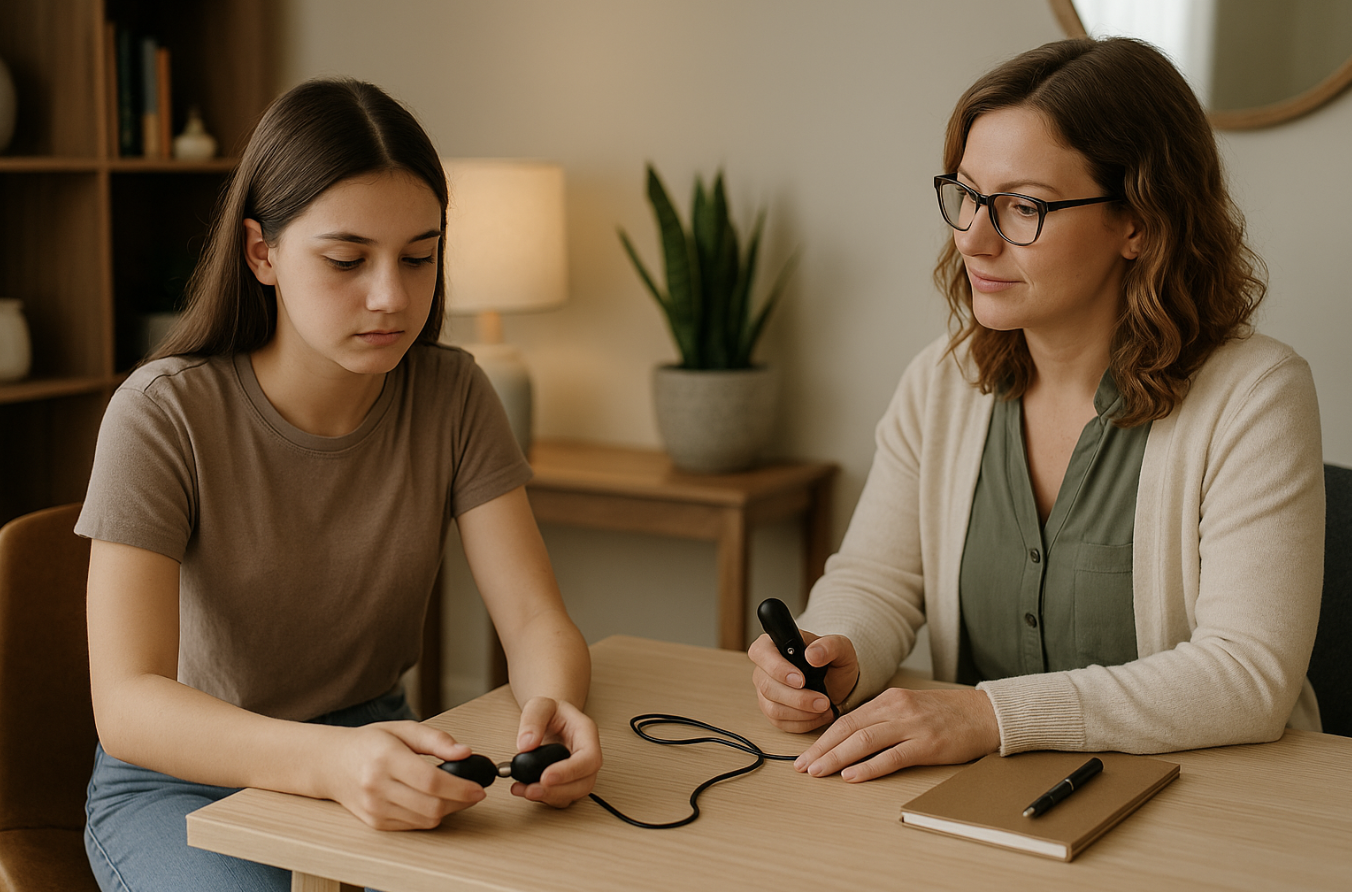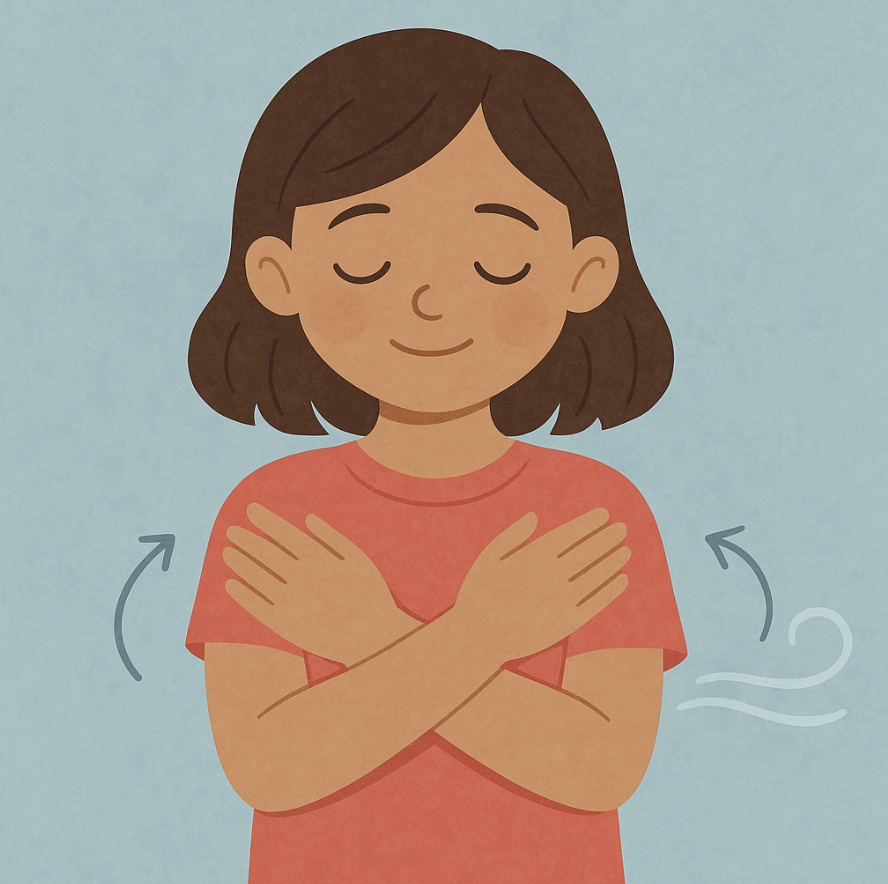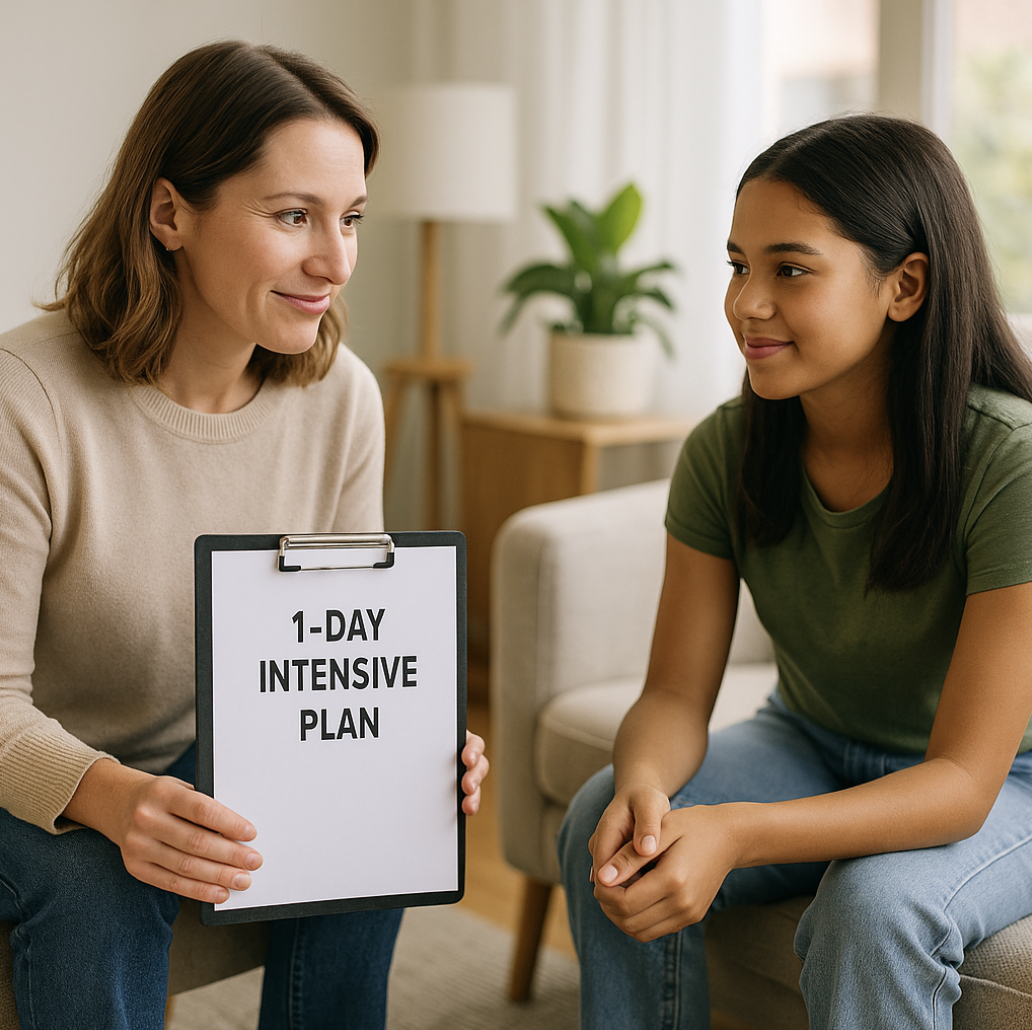
How a Therapy Intensive Helps Your Anxious Teen Reflect & Create Meaningful Change
As we wrap up the first month of the new year, many anxious teens feel a growing sense of pressure—academically, socially, and emotionally. What’s meant to feel like a fresh start can instead bring overwhelm, self-doubt, and burnout. Therapy intensives create the space anxious teens need to slow down, reflect, and build clarity—helping them move into the new year feeling supported rather than pressured.

How to Manage Holiday Overwhelm and Stay Present
The holiday season can feel overwhelming for anxious, high-achieving teens who already carry so much pressure on their shoulders. If your child is struggling to stay present or enjoy the moments that matter, you’re not alone—this season often amplifies stress in ways that feel unexpected and hard to manage.

Breaking Free From Perfectionism This Holiday Season
Holiday perfectionism can take over quickly for anxious children. They may worry about disappointing family members, making mistakes, or not living up to the “holiday magic” they see around them. That pressure builds until your child feels overwhelmed, irritable, or emotionally drained. With therapeutic support, kids can learn to challenge unrealistic expectations, feel safer making mistakes, and reconnect with what truly matters during the holiday season.

Combat Holiday Burnout with a Therapy Intensive
The holidays are supposed to feel joyful—but for many anxious, people-pleasing teens, this season brings a wave of holiday burnout long before the celebrations even begin. Between family expectations, emotional labor, school stress, and the pressure to “keep everyone happy,” it’s easy for teens to slip into emotional exhaustion during the holidays. A therapy intensive offers a focused, restorative space to help them regulate, reset, and walk into the season feeling grounded instead of overwhelmed.

How Therapy Intensives Help You Address Family Dynamics Before the Holidays
If you're a busy parent with an even busier schedule, you might not have time for months of therapy before Thanksgiving hits. That’s where holiday therapy intensives come in. These focused sessions help you process family-related stress, understand emotional triggers, and enter the season feeling more grounded and in control. Whether you’re dreading difficult conversations, feeling guilt about boundaries, or just want to protect your peace—therapy intensives can help you prepare from the inside out.

How Therapy Intensives Help You Move Forward When You Feel Stuck
Feeling stuck in your healing journey? You’re not alone. Whether your teen is battling anxiety, avoiding school, or just can’t seem to move forward emotionally, therapy intensives offer a focused and accelerated path to change. In this post, we’ll explore how extended therapy sessions can help break through emotional blocks, provide clarity, and create real momentum—especially when weekly therapy no longer feels like enough.

Therapy Intensives vs. Weekly Therapy: Which Is Right for You This Fall?
Feeling stuck deciding between weekly therapy or a deep-dive intensive? This post breaks down the key differences between traditional therapy and therapy intensives—so you can make the best choice for your healing journey this fall. Whether you’re looking for faster relief from anxiety, a more focused approach to trauma, or flexibility for a busy schedule, you’ll discover how each option supports meaningful progress. Learn how therapy intensives can offer a reset when you need it most.

The Hidden Benefits of Therapy Intensives You Might Not Know About
Think therapy intensives are just longer sessions? Think again. Beyond saving time, therapy intensives offer unexpected benefits like deeper emotional breakthroughs, faster momentum, and a more personalized healing experience. Whether you’re navigating anxiety, trauma, or simply feel stuck, an intensive might be the reset your mind and body have been craving.

How Therapy Intensives Work: What Clients Need to Know Before Starting
Therapy intensives aren’t just about doing more therapy—they’re about doing it differently. In this collaborative, focused format, your teen and their therapist work side by side to make meaningful progress in a shorter amount of time. Whether your teen is struggling with anxiety, people-pleasing, or trauma, therapy intensives create space for deeper healing and faster breakthroughs. Learn how this unique partnership works, what to expect, and how this powerful process can jumpstart your teen’s growth.

Why October Is the Perfect Month to Try a Therapy Intensive
Between the back-to-school rush and the holiday hustle, October offers a rare moment to breathe. With routines falling into place and a slower pace settling in, it’s the ideal time to pause, reflect, and prioritize mental health. A therapy intensive during this season can help your teen make meaningful progress without the long-term time commitment of weekly sessions. It’s a focused reset—designed to support deep healing before life speeds up again.

Customizing Therapy Intensives for Your Individual Healing Journey
Healing isn’t one-size-fits-all—especially for teens navigating anxiety, overwhelm, or emotional shutdown. Personalized therapy intensives offer flexible, extended sessions tailored to your teen’s specific needs, goals, and pace. With a customized approach using EMDR, regulation tools, and targeted support, your teen can experience faster progress and deeper connection—in a format that truly fits.

How to Set Healthy Boundaries for Your Mental Health
Setting healthy boundaries is one of the most powerful ways to support your mental health—especially when life feels overwhelming. Whether you're a parent juggling your teen’s anxiety or simply stretched too thin, learning to say no, protect your time, and prioritize your needs can reduce stress and improve emotional balance. This guide offers practical, therapist-approved boundary setting tips to help you feel more grounded and in control.

How Therapy Intensives Accelerate Your Path to Healing
When weekly therapy feels too slow, therapy intensives offer a powerful alternative—especially for teens with anxiety or panic attacks. By combining extended sessions with tools like EMDR for teens and bilateral stimulation for anxiety, intensives create faster emotional breakthroughs, helping families move forward with clarity and confidence.

Why Investing in a Therapy Intensive Could Save You Time and Money
Therapy intensives offer a powerful, time-saving alternative to traditional weekly sessions—especially for teens struggling with panic attacks and anxiety. By condensing months of progress into just a few sessions, intensives provide efficient, cost-effective therapy using tools like EMDR and bilateral stimulation for anxiety, helping families find lasting relief faster.

Ways Therapy Intensives Can Support Individuals + Relationships
Therapy intensives are a flexible, time-efficient way to create meaningful progress for teens with anxiety, individuals navigating self-esteem or trauma, and families looking to rebuild trust. With extended sessions and tools like EMDR therapy for teens, intensives allow for deeper emotional work, improved communication, and personalized strategies—without the long wait of weekly therapy.

How Bilateral Stimulation in EMDR Helps Kids Manage Anxiety
Wondering how EMDR helps anxious kids feel calmer and more in control? Bilateral stimulation—a key part of EMDR— gently supports children through anxiety, big feelings, and overwhelming memories. Learn what a session looks like, how it helps, and simple ways to support your child at home.

EMDR Prep- What Is Resourcing?
Resourcing in EMDR is a crucial first step—especially for teens with anxiety, ADHD, or ODD. Before diving into trauma work, teens need tools to regulate their emotions, calm their bodies, and feel safe. This blog explains what resourcing is, how it works, and why it’s essential for teens showing signs of anxiety or emotional dysregulation. Learn how techniques like safe place visualizations and resource tapping lay the foundation for healing—especially when guided by experienced child therapists in Wayne NJ.

New to Therapy? Consider an Intensive for Your First Experience
Starting therapy for the first time can feel overwhelming—especially for teens. If weekly sessions sound intimidating, a therapy intensive for beginners might be the perfect way to ease in. This blog explores why intensives are a supportive starting point for teens struggling with anxiety or panic and what to expect during your first session.

No Time for Weekly Sessions? Try a Therapy Intensive Instead
When life feels nonstop with school, sports, and packed schedules, finding time for weekly therapy can be tough. But your teen’s mental health doesn’t have to wait. Therapy intensives offer a focused, short-term option that delivers meaningful support—without the ongoing time commitment.

Navigating Social Anxiety During Summer Events
Summer is packed with social events—but for teens with social anxiety, that can feel overwhelming. From weddings to neighborhood BBQs, this blog explores why summer can intensify social anxiety, offers practical coping tools, and explains how therapy for social anxiety can help your teen feel more confident and at ease.
![BOHO Beauty [Template] (Copy)](http://images.squarespace-cdn.com/content/v1/67abf80c5306ff1eee619e9a/d3e79aca-9626-4b48-8dc3-cd439fd8c6fd/Therapy.png?format=1500w)